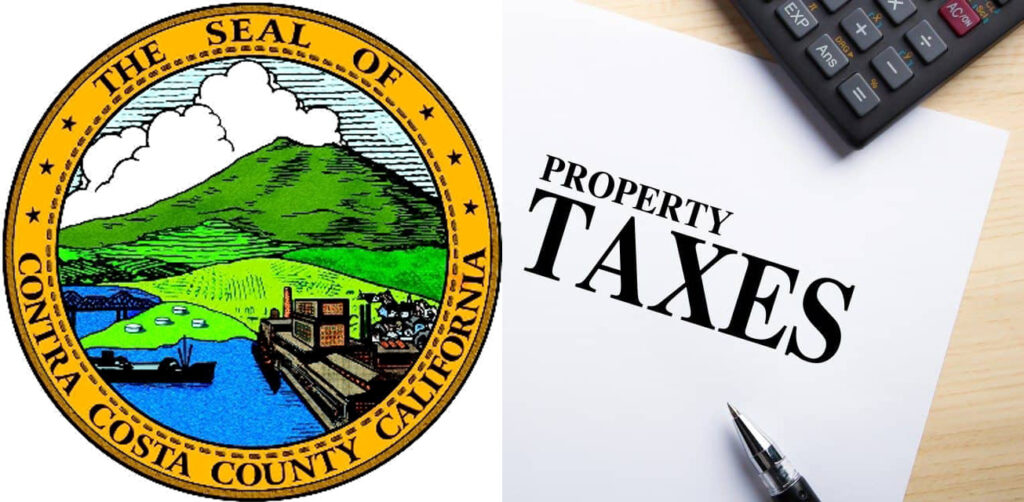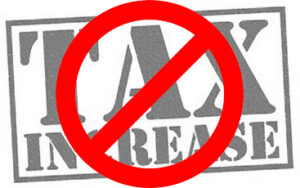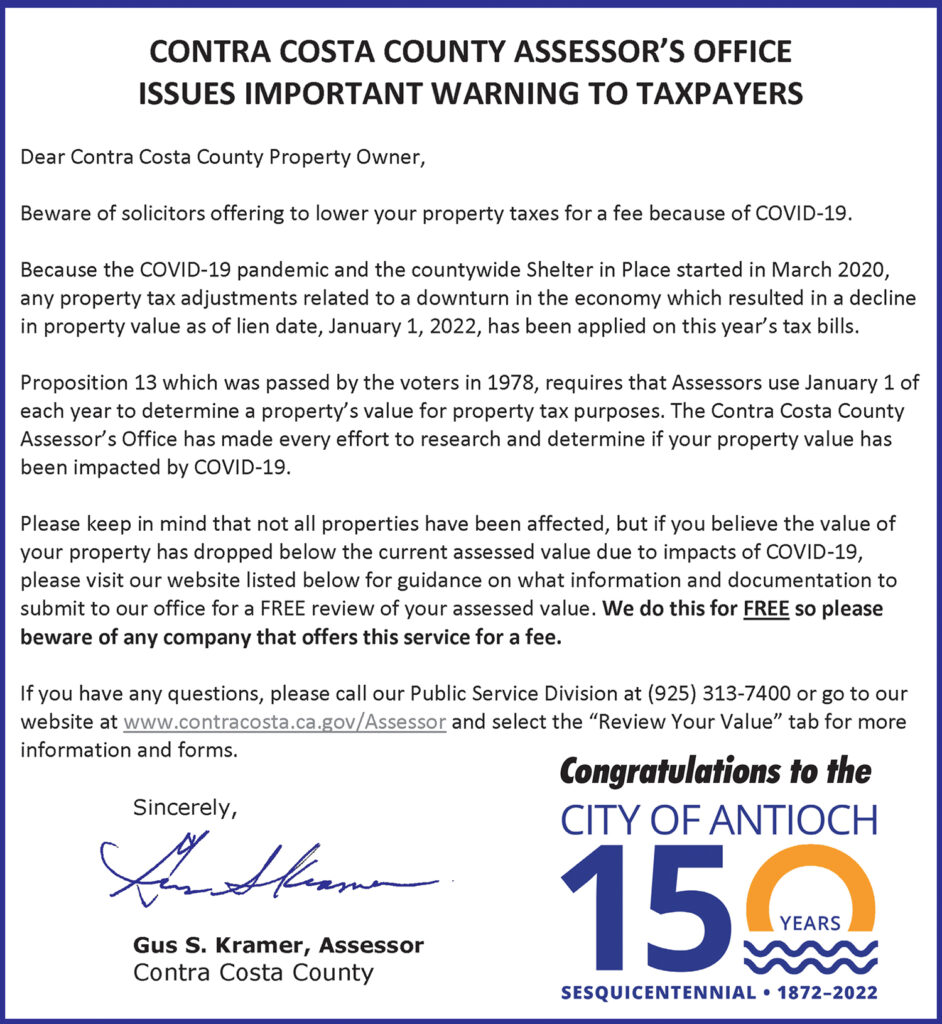
Due to impact of winter storms; includes quarterly tax payments
The Internal Revenue Service announced on Feb. 24, 2023, that California storm victims, including Contra Costa County residents and businesses, now have until October 16, 2023, to file various federal individual and business tax returns and make tax payments. The deadline was previously extended to May 15 on January 10 and didn’t include Contra Costa. But that changed the following day. Then on Thursday, Gov. Gavin Newsom announced state tax returns will also not be due until Oct. 16, as well.
The IRS is offering relief to any area designated by the Federal Emergency Management Agency (FEMA). This means that individuals and households that reside or have a business in Alameda, Colusa, Contra Costa County qualify for tax relief. The current list of eligible localities is always available on the Tax Relief in Disaster Situations page on IRS.gov.
The tax relief postpones various tax filing and payment deadlines that occurred starting on January 8, 2023. As a result, affected individuals and businesses will have until Oct. 16, 2023, to file returns and pay any taxes that were originally due during this period.
This includes 2022 individual income tax returns due on April 18, as well as various 2022 business returns normally due on March 15 and April 18. Among other things, this means that eligible taxpayers will have until Oct. 16 to make 2022 contributions to their IRAs and health savings accounts.
The Disaster Assistance and Emergency Relief for Individuals and Businesses page has details on other returns, payments and tax-related actions qualifying for the additional time.
The IRS automatically provides filing and penalty relief to any taxpayer with an IRS address of record located in the disaster area. Therefore, taxpayers do not need to contact the agency to get this relief. However, if an affected taxpayer receives a late filing or late payment penalty notice from the IRS that has an original or extended filing, payment or deposit due date falling within the postponement period, the taxpayer should call the number on the notice to have the penalty abated.
In addition, the IRS will work with any taxpayer who lives outside the disaster area but whose records necessary to meet a deadline occurring during the postponement period are located in the affected area. Taxpayers qualifying for relief who live outside the disaster area need to contact the IRS at 866-562-5227. This also includes workers assisting the relief activities who are affiliated with a recognized government or philanthropic organization.
Individuals and businesses in a federally declared disaster area who suffered uninsured or unreimbursed disaster-related losses can choose to claim them on either the return for the year the loss occurred (in this instance, the 2023 return normally filed next year), or the return for the prior year (2022, normally filed this tax season). Be sure to write the FEMA declaration number – 3591-EM − on any return claiming a loss. See Publication 547 for details.
The tax relief is part of a coordinated federal response to the damage caused by these storms and is based on local damage assessments by FEMA. For information on disaster recovery, visit disasterassistance.gov.
California Extension Matches IRS
In addition, California is extending the tax filing deadline for Californians impacted by December and January winter storms to October 16, 2023 – aligning with the IRS
In addition to tax relief measures that Governor Gavin Newsom announced in January, California is also extending the state tax filing and payment due dates to October 16, 2023 for Californians impacted by the winter storms in December and January. This aligns California with the Biden Administration, which announced that the IRS extended various due dates until October 16, as well.
“As communities across the state continue recovering from the damage caused by the winter storms, California is working swiftly to help recovering Californians get back on their feet,” said Governor Newsom. “The state is aligning with the Biden Administration and extending the tax filing deadline in addition to the tax relief announced earlier this year.”
Last month, Governor Newsom announced tax relief for those impacted by winter storms, giving people the ability to claim a deduction for disaster loss and extending certain filing deadlines.
The following counties are eligible for this extended tax relief, per the IRS announcements here and here:
Residents and businesses in Alameda, Alpine, Amador, Butte, Calaveras, Colusa, Contra Costa, Del Norte, El Dorado, Fresno, Glenn, Humboldt, Inyo, Kings, Lake, Los Angeles, Madera, Marin, Mariposa, Mendocino, Merced, Mono, Monterey, Napa, Nevada, Orange, Placer, Riverside, Sacramento, San Benito, San Bernardino, San Diego, San Francisco, San Joaquin, San Luis Obispo, San Mateo, Santa Barbara, Santa Clara, Santa Cruz, Siskiyou, Solano, Sonoma, Stanislaus, Sutter, Tehama, Trinity, Tulare, Tuolumne, Ventura, Yolo, and Yuba counties who have been affected by severe winter storms, flooding, landslides, and mudslides are eligible for tax relief.
TAX EXTENSION
To help alleviate some of the hardship many have endured during this trying period, the FTB has extended the filing and payment deadlines for individuals and businesses in California until October 16, 2023.
This relief applies to deadlines falling on or after January 8, 2023, and before October 16, 2023, including the 2022 individual income tax returns due on April 18 and the quarterly estimated tax payments, typically due on January 17, 2023 and April 18, 2023. Those payments were previously extended to May 15, 2023 for those impacted by winter storms.
The IRS announced tax relief for Californians affected by these winter storms. Taxpayers affected by these storms qualify for an extension to October 16, 2023 to file individual and business tax returns and make certain tax payments. This includes:
- Individuals whose tax returns and payments are due on April 18, 2023.
- Quarterly estimated tax payments due January 17, 2023, April 18, 2023, June 15, 2023, and September 15, 2023.
- Business entities whose tax returns are normally due on March 15 and April 18.
- PTE Elective Tax payments due on June 15, 2023.
CLAIMING DISASTER LOSSES
Taxpayers affected by a presidentially declared disaster may claim a deduction for a disaster loss. Taxpayers may claim a disaster loss when filing either an original or amended tax year 2022 tax return.
When filing their return, taxpayers should write the name of the disaster in blue or black ink at the top of their tax return to alert FTB. If filing electronically, taxpayers should follow the software instructions to enter disaster information. If a taxpayer receives a late filing or payment penalty notice related to the postponement period, they should call the number on the notice to have the penalty abated.
Additional information and instructions are available in FTB Publication 1034, 2022 Disaster Loss: How to Claim a State Tax Deduction.
Disaster victims can receive free copies of their state returns to replace those lost or damaged. To do so, they should use form FTB 3516 and write the name of the disaster in blue or black ink at the top of the request.
For a complete list of all disasters declared in California, see the chart on FTB’s disaster loss webpage.













 Sacramento
Sacramento
 San Francisco—Hundreds of solar workers, consumers, clean energy advocates, community leaders, conservationists, and climate activists will join together at the California Public Utilities Commission (CPUC) headquarters building in San Francisco on Thursday to protest the CPUC’s latest proposal to tax rooftop solar and drastically reduce the credits consumers receive for selling their solar energy back to the grid.
San Francisco—Hundreds of solar workers, consumers, clean energy advocates, community leaders, conservationists, and climate activists will join together at the California Public Utilities Commission (CPUC) headquarters building in San Francisco on Thursday to protest the CPUC’s latest proposal to tax rooftop solar and drastically reduce the credits consumers receive for selling their solar energy back to the grid.

 CALIFORNIA –
CALIFORNIA – 















